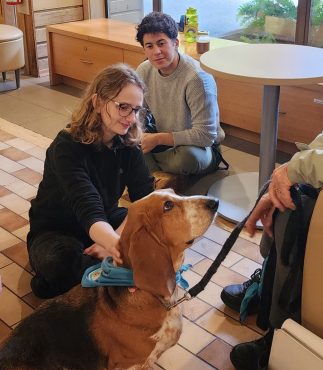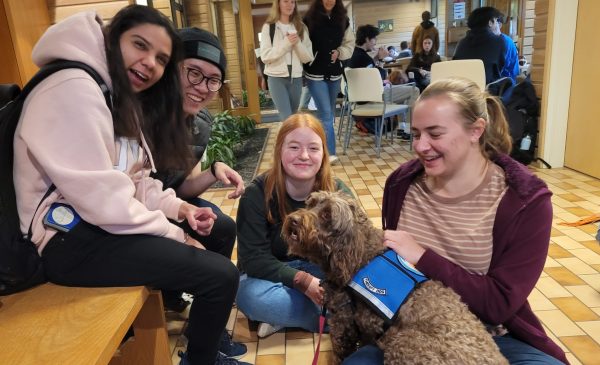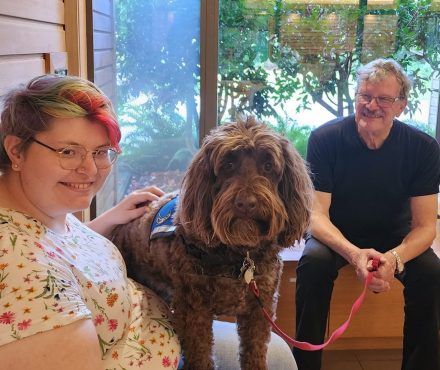Therapy animals like those hosted at UVic’s Mutifaith Centre can boost optimism and wellness for students

Photo by Paul Voll.
Baron Von Hamburglar, or Bear for short, is a miniature schnauzer with the black-masked eyes of a racoon and the fluffy ears of a teddy bear. Inside UVic’s Multifaith Centre, four students sit on the floor in a circle around Bear, stroking his soft, brown coat. Around Bear’s neck hangs an official sky-blue Pacific Animal Therapy Society (PATS) kerchief that looks a couple sizes too big.
A few feet away, Jura, a Bernese Mountain Dog, rolls onto her back for belly-scratches — legs sprawled, tongue shamelessly drooping onto the floor — while Sadie, a Boxer-Lab, sits stoically, side-eying Jura’s shenanigans with skeptical maturity. Tea, coffee, and sweets cover two tables at the edge of the room, which Piper, a hound-mix, watches with unfazed dedication (just in case). Welcome to Pet Café.
UVic’s Anglican spiritual care provider, Reverend Ruth Dantzer, founded Pet Café in 2017 after hearing about a cat café in Vancouver. She hoped to replicate something similar at UVic that could help bring attention to the Multifaith Centre’s programs and resources. Now, seven years later, Pet Café — which is fully managed by the Multifaith Center and funded by the Anglican Diocese of B.C. and PATS — attracts an average of 150 students every Wednesday to the centre for afternoon cuddles with therapy dogs. No fee, no sign up, no appointment required.
Bear and his owner Jenni Aitken have been regulars at Pet Café since 2019 when Bear became certified by PATS, a volunteer organization that connects volunteers and their pets to health care facilities, care homes, and schools across Vancouver Island. When Aitken got Bear, it wasn’t with the intention of volunteering him as a therapy dog. However, “The Hamburglar” had other ideas.
“We would walk in the neighborhood and just randomly he would choose people to approach,” says Aitken. “‘I’m going to sit beside you or touch your feet.’ And more often than not, people were like, ‘oh my gosh, I needed this’ and ‘I’ve just lost my dog’ or ‘I’m going through a tough time.’”

Photo provided by Ruth Dantzer.
Aitken, whose background is in social work, quickly picked up on Bear’s gift and began the PATS application process to have Bear therapy certified. Part of this process includes a veterinarian assessment to ensure that each dog has a calm, gentle demeanor and enjoys being touched. Bear allowed the vet to pick him up, pinch his toes, and touch his teeth. And when the vet began screaming and waving her arms, Aitken says Bear wasn’t fazed, only looking back at Aitken as if to ask, “Is she okay?”
According to Psychology Today, therapy dog sessions for students at North American universities have become popular in recent years as a low barrier, evidence-based way to boost student wellness. A growing body of research shows that therapy dog interventions at universities help reduce student stress and boost relaxation.
A 2023 study co-authored by Dr. John-Tyler Binfet — founder and director of UBC’s dog therapy program, Building Academic Retention through K9s or B.A.R.K. — found that students exposed to therapy dog interventions on campus also experienced an increase in optimism. Binfet suggests that this finding “holds the potential to recalibrate how students think about their ability and potential as a student within the post-secondary context” and, in turn, “may foster a more positive outlook on their university experience and their ability to cope with the academic demands being placed on them.”
Kneeling on the floor beside Bear is 21-year-old Hannah Schlosser-Hall, a third-year sociology student who’s been coming to Pet Café every Wednesday for almost two years.
“Me and Bear are tight,” Schlosser-Hall says nonchalantly, as if speaking about another student. “I make sure I don’t have any classes at this time. This is my favorite thing.”
Schlosser-Hall, who has a labradoodle back home at her parents’ place in Seattle, says that Bear and the other dogs at Pet Café not only help fill her furry friend void when she’s away from her family dog, but also act as a midweek re-energizer when her school workload becomes intense.
“I miss my dog a lot. So, it’s really nice to just come hang out,” says Schlosser-Hall. “But when I’m really stressed … I feel like it helps me sort of reset a little bit. When I leave, I feel like I’m ready to start another wave of studying, or work on an assignment, or whatever it is. It helps kind of refresh my energy.”
Rebecca Myk, a third-year psychology major, pours steaming coffee into a mug and takes a seat, content to watch a group of students huddle on the floor around Sadie — whose wrinkled short snout and drooping eyes seem to suggest charming disinterest.
Myk has been coming to Pet Café ever since she stumbled upon the Multifaith Centre on a spring afternoon in her freshman year. That fateful day, she noticed a group of students outside standing around several dogs and, on that particular Wednesday, a few ducks that a past employee used to bring.
Like Schlosser-Hall, Myk also left a family dog back home to attend university.
“I got [Holly] when I was seven or eight, so she’s been a big part of my life. Definitely super weird going away for university and not seeing her all the time,” says Myk, explaining that she has to settle for daily pictures of Holly, texted from her mom, because FaceTime only confuses Holly. “She can hear my voice, but she doesn’t know where I am.”
Myk adjusts her clear-framed glasses, takes a sip from her coffee, and reflects.
“They emit so much love, whether they know you or you’re first meeting them … I definitely feel that every time I come here,” says Myk, who prioritizes attending Pet Café every week because of the “instant results” she gets.
“I get a lot of energy to go back [to studying],” says Myk. “I had four hours of classes this morning and then this as a break, and I’m like, ‘okay, I have so much brainpower to get back into it now.’”
Aitken, Bear’s owner, recalls an instance when an international student from Iran came to Pet Café and disclosed to Aitken that she had left all her family back home to come study in Canada. Aitken says that she could tell the student felt “very alone and needed some physical connection,” wanting Bear to sit on her lap.
“Give him credit; Bear’s not always going to do that. But he got up for a couple minutes so she could have a moment,” says Aitken, smiling. “It was delightful.”

Photo provided by Ruth Dantzer.
Jura, the Bernese Mountain Dog, rolls back over and sits up, her tall frame towering, almost comically, next to Bear. A student in a faded pink hoodie remarks that it looks as though Jura is smiling. Jura’s owner tells a group of students that not only can dogs smile, but domesticated dogs have evolved expressive faces that allow them to lift their inner eyebrows, making their eyes appear larger and more “puppy-dog-like.” It’s a result of human selection, he explains, that doesn’t exist in wolves. Accurate or not, some students continue to listen as Jura’s owner transitions into explaining the breeding history of Bernese Mountain Dogs. But as Pet Café nears closing time, most of the remaining students have gathered in small groups of their own. The room is alive with chatter, and the plates of cookies on the table are now mostly gone, apart from a collection of crumbs that still have Piper the hound’s attention.
Aitken says it’s this sense of community that’s her favorite part of coming each Wednesday.
“I really enjoy seeing the connections made between students. The dogs can be front and center on occasion … but there [are] other times where the dogs are more secondary,” says Aitken. “If others can find a moment to come here and connect with each other, that’s gold.”

Photo provided by Ruth Dantzer.
Reverend Dantzer, the Café’s founder, says she’s also noticed this benefit of student connection at the Pet Café, explaining that the dogs serve as icebreakers, but conversation and connections will often extend beyond them.
Dantzer says she’s seen and heard a lot of stories from students who’ve made lifelong friendships that started at the Pet Café.
Before the pandemic put a temporary stop to the tradition, Dantzer partnered with Beacon Hill Children’s Farm every spring to bring baby goats to campus, an event that proved to be wildly popular, once reaching upwards of 1 500 student visitors over the course of one hour-and-a-half session in 2018. Dantzer says she is working on bringing baby goats back in an effort to diversify the animals who attend and is even speaking with a person who has llamas who are trained as therapy animals.
Bear and Aitken are the last to leave, alongside a group of four students who linger for last-minute pets on the way out. After promising to return when Pet Café resumes sessions on Jan. 24, the students wander back to their own corners of the campus, to the demands and deadlines that the end of the semester requires.
Bear toddles to a bush for a well-deserved pee.







